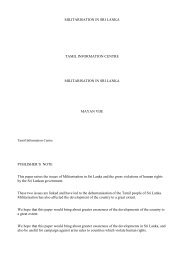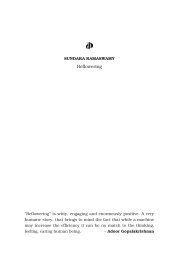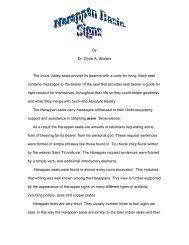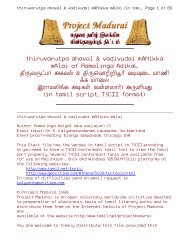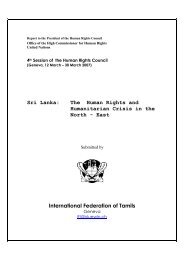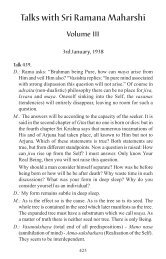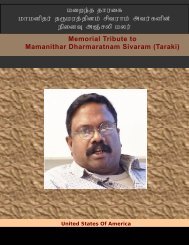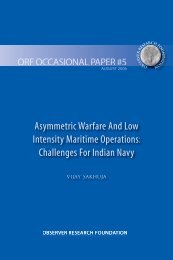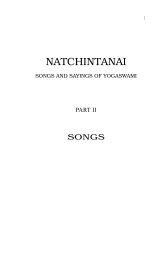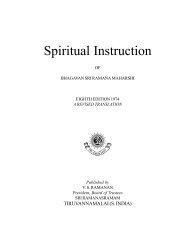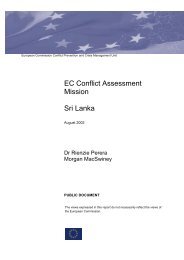Conflict in Sri Lanka: Ground Realities - Tamil Nation & Beyond
Conflict in Sri Lanka: Ground Realities - Tamil Nation & Beyond
Conflict in Sri Lanka: Ground Realities - Tamil Nation & Beyond
- No tags were found...
You also want an ePaper? Increase the reach of your titles
YUMPU automatically turns print PDFs into web optimized ePapers that Google loves.
usually tends to be obfuscated <strong>in</strong> discussions on the structure ofthe state, or on federal versus unitary constitutions, is that theyrepresent different aspects of the m<strong>in</strong>dset of the rul<strong>in</strong>g class <strong>in</strong>Colombo. Whether we like it or not, the rul<strong>in</strong>g class has with<strong>in</strong>itself substantial elements which are loath to share political powerwith the <strong>Tamil</strong>s through constitutional means. With Rajapakseassum<strong>in</strong>g the presidency, these elements have acquired greatlegitimacy. What is more, no solution to the ethnic problem <strong>in</strong>the future is go<strong>in</strong>g to be devoid of a substantial <strong>in</strong>put from theextreme nationalist sections of <strong>Sri</strong> <strong>Lanka</strong>’s southern populationand their political representatives.It has been the ploy of the rul<strong>in</strong>g class <strong>in</strong> Colombo to speak abouta consensus whenever it has had to take pa<strong>in</strong>ful decisions ofshar<strong>in</strong>g power with the <strong>Tamil</strong>s. What is important <strong>in</strong> the build<strong>in</strong>gof this consensus is that the JHU with n<strong>in</strong>e seats is treated asimportant as the UPFA (105 seats) and UNP (82 seats)! (The actual<strong>in</strong>fluence of the JHU <strong>in</strong> gett<strong>in</strong>g Rajapakse elected as presidentcannot be quantified, but it is unlikely to be substantial). Thequestion we have to ask is: why is the S<strong>in</strong>hala polity, whichplaces faith <strong>in</strong> numbers and numerical majorities (as it does <strong>in</strong>parliament) to defeat everyth<strong>in</strong>g that affects its <strong>in</strong>terests, bend<strong>in</strong>gover backwards to solicit the op<strong>in</strong>ion of the m<strong>in</strong>iscule JHU? Theanswer is obvious – to ensure that the <strong>in</strong>transigence of JHU (andof course the JVP) could be used to dilute what is offered to the<strong>Tamil</strong>s as the ‘consensus op<strong>in</strong>ion of the south,’ and thereby seeto it that hegemony does not slip out of the S<strong>in</strong>hala rul<strong>in</strong>g class.The fact is that it is not the <strong>in</strong>dividual political parties that matterwhen decid<strong>in</strong>g what ought to be ‘conceded’ by the Colombopolitical elite. It is the rul<strong>in</strong>g class as a whole, which is reluctantto share power, us<strong>in</strong>g the mechanisms built <strong>in</strong>to the politicalsystem to frustrate <strong>Tamil</strong> aspirations. This is not the first time<strong>in</strong> the recent past that presidents have used the consensuscard to delay act<strong>in</strong>g decisively. In 2000 for <strong>in</strong>stance, formerpresident Chandrika Kumaratunga presented her proposal forconstitutional reform. For some months preced<strong>in</strong>g this, activenegotiations were undertaken by the PA with the UNP to arriveat a consensus. The upshot of it was the orig<strong>in</strong>al draft readied <strong>in</strong>19



